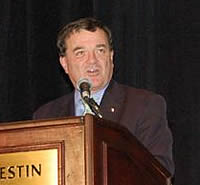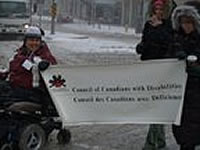Act Now

Empower U: Learn to Access Your Disability Rights Training on Canadian Human Rights, the Convention on the Rights of Persons with Disabilities (CRPD) and its Optional Protocol (OP) training aims to increase awareness of how to address discrimination using more familiar Canadian human rights laws such as Human Rights Codes and the newer international Convention on the Rights of Persons with Disabilities (CRPD). This is training for persons with disabilities by persons with disabilities. The training is part of a project funded by Employment and Social Development Canada and implemented by the Council of Canadians with Disabilities (CCD) in collaboration with Canadian Multicultural Disability Centre Inc. (CMDCI), Citizens With Disabilities – Ontario (CWDO), Manitoba League of Persons with Disabilities (MLPD) and National Educational Association of Disabled Students (NEADS). Read more.
Sign Up for our monthly digest
A monthly newsletter from CCD about what is happening in the community
A Voice of Our Own: January 2008 Special Edition
End Exclusion 2007 was an incredible success, with a registration of 370 participants, 3 Federal Cabinet Ministers addressing the assembly, a national action plan endorsed by over 90 national, provincial and local organizations. The lead partners for this event were the Council of Canadians with Disabilities (CCD), the Canadian Association for Community Living (CACL) and the Canadian Association of Independent Living Centres (CAILC).
In this Special Edition of A Voice of Our Own, CCD presents an overview of the events, which took place at End Exclusion 2007.
Contents:
- Vision is Not Enough by Marie White
- Next Steps for Alleviating Poverty by Michael J. Prince
- Some Highlights from End Exclusion 2007
- The March to Parliament Hill
- MP Statement on End Exclusion
Vision is Not Enough!
by Marie White[1]
(This is an abridgement of comments made by CCD's Chairperson Marie White at End Exclusion on 22 November 2007. Marie's comments focus on selected portions of the Action Plan and on future activities.)
Our End Exclusion national Action Plan has been endorsed by over 80 organizations. Interest is being shown by the Government of Canada—Minister Solberg was here this morning. The Hon. Minister James Flaherty and the Hon. Minister Peter McKay will also be with us today. We hope that End Exclusion will be a catalyst for the community.
We all have to take up the challenge to identify our priorities, our issues for action by government at all levels whether it is for municipal governments to get sidewalks cleared or the provinces to improve investment in disability-related supports and whether it's the federal government to ensure leadership.
Our focal message is vision is not enough—action is required.
I don't believe that at this point the vision has been clearly understood by the federal ministers. I believe that they are beginning to get it, but if we are to reach our turning point, if we are to evolve, it is with them we must do it.
We have come to a place in 2007 where words are not enough. Last year we presented our vision and our vision was clear. This year, what we want to do is stop talking and see action. And again to do that it is important that we engage everyone.
We can't do it unless every single individual who has a disability, family members, supporters and advocates, move with us. Because it is with all of us that we will be able to accomplish things.
We believe that there is a need for new ways of thinking. It must be adopted by employers and governments and providers of public service. We know the solutions. We can provide them. We can talk about them. And we know that there are opportunities for innovative policies.
Solutions are complex and multi-jurisdictional, but, if we had always allowed that to stand in our way, we would not be here today. So, we can't accept that as an excuse for inaction. It cannot happen any longer.
There are many opportunities to improve the status of Canadians with disabilities. We know that the Government has already begun undertaking a number of commitments to address our issues internationally. We know with the adoption of the UN Convention on the Rights of Persons with Disabilities the issue is receiving significant profile. We also know that as Canada has to demonstrate its leadership on that front, it must address the poverty, the unemployment, the lack of disability-related supports, and the denial of our basic rights of self determination. A demonstration of leadership begins at home.
A national disability strategy for access and inclusion
A national disability strategy is needed. A disability strategy is not a one-time injection of funding. A disability strategy would enable Canadians with disabilities and their families to have what they need --to have income; aids and devices; personal supports; medication; environmental accommodation. We would then be included socially, culturally, politically, economically, in all realms of activity available to Canadians. These would be similarly available to Canadians with disabilities.
We are well aware of the building blocks indentified in "In Unison"—employment, adequate income and disability-related supports. It's these that allow and enable the citizenship of persons with disabilities and create that accessible and inclusive Canada.
We need to start using the two terms together. We don't just want access. We want inclusion. We can often get in the door, but once we get in, are we included? Are we able to do what our neighbors and friends and family members can do? I think we have to start talking about inclusion because it is a more all encompassing word and it speaks to where we want to be. And where do we want to be?
I believe we want to be in a country where we can live where we want to. We can go to our neighborhood school. We can have careers that we want; careers for which we have skills and abilities. We want to have aspirations. We want to be equal. We want to share in the resources and wealth of a country which has much to share.
We should never lose sight of that because we know that Canada has a surplus. We know that there are investments which can be made. A national plan on disability has to transcend, it has to go beyond our fragmented reactive approach. It has to have long-range, medium range and short-term plans.
Federal leadership
For an inclusive and accessible Canada to be a reality, the government of Canada has to show leadership in many areas. We need enhanced disability supports to enable independent living, active citizenship, full participation.
We need an enhanced federal role alleviating the abject total poverty of many people with disabilities and their families, so that we can free up some dollars at the provincial and territorial levels for new investment in disability supports. We need government to show leadership in the federal and territorial realm because without it, our ability to move forward is constrained.
We need labor force inclusion measures. We need a national social development role to promote access and community inclusion, because you see, ladies and gentlemen, we don't seek charity. We seek parity. We don't seek exclusion; we seek inclusion.
I think that we need to continue to remember that if we, as a collective group, do not go back to our own municipalities and provincial governments and be heard recommending clear directed action, then we will be here again, and we will have not seen the movement we need.
Disability-related supports
We will not be included without the disability-related supports we need. We can be skilled. We can be the engineers of the world. We can be the media people, the public relations people, but if we don't have the support that we need to be able to actualize those skills and to do what it is we need to do, then we will not have the opportunities that the employment environment presents to us. I think it was Mary Poppins who said: "Let's start at the very beginning." And the beginning is disability support so that inclusion becomes where we are, and exclusion a thing of the past.
Our national Action Plan on disability-related supports calls for:
New Investments in Disability Related Supports—Properly executed new investments can bring change to the lives of people with disabilities. An appropriately targeted investment in disability-related supports would assist Canadians with disabilities to participate in early learning and childcare, become educated and employed, live more independently, and look after their families.
Such an investment is the priority of the disability community and is the foundation upon which a comprehensive National Action Plan on Disability must be built. Central to this initiative is a commitment to deinstitutionalization and removing the stigma attached to disability.
The Government of Canada must:
- Create the national social, economic and political conditions for people with disabilities to empower themselves and to achieve their full potential.
- Work with provinces and territories to explore ways of increasing access to and improving the range of available disability supports.
- Work with provinces and territories to provide support for the building of safe, affordable, accessible and supportive housing.
- Acknowledge that residential institutions have no place in the lives of people with disabilities and support provinces and territories to finish the process of closure.
- Work with Band Councils to ensure equal access to disability-related supports for First Nations people with disabilities living on reserve.
Poverty and people with disabilities
The poverty of Canadians with disabilities is a national shame. The fact of poverty is twice as high for Canadians with disabilities and their families than with nondisabled people and it's even higher with First Nations and Aboriginal persons with disabilities. The present support systems are not a panacea for people with disabilities. The Government of Canada must commit to addressing poverty.
Our national Action Plan calls for new initiatives to alleviate poverty
The poverty of Canadians with disabilities is a national disgrace. Canadians with disabilities and their families are twice as likely to live in poverty as other Canadians and the incidence of poverty among Aboriginal People with disabilities is even higher. Existing systems of income support are failing Canadians with disabilities. The Government of Canada must commit to addressing poverty and reforming Canada's income support programs for Canadians with disabilities.
First steps could include:
- Making the Disability Tax Credit Refundable.
- Making those eligible for Canada Pension Plan Disability Benefits automatically eligible for the Disability Tax Credit.
- Making Canada Pension Plan Disability Benefits non-taxable.
- Expanding Employment Insurance Sick Benefits to 52 weeks.
- Ensuring new federal benefits such as the Registered Disability Savings Plan are not clawed back by provinces and territories from those on social assistance.
Long-term reforms could include:
- An expanded federal role in income support for Canadians with disabilities thus freeing up resources at provincial and territorial levels for re-investment in supports and services.
(For the remainder of the Action Plan please go to the End Exclusion web site.)
After End Exclusion 2007
Our website, for those who have not had a chance or who wish to go and endorse our Action Plan, is very simple: www.endexclusion.ca.
To summarize the day, we are committed to this National Action Plan and we hope after today, after further reading and after discussing it with your local, provincial, territorial and national organizations that you too will believe that through these directions and through action, true transformational change will occur.
Over the next year, we will indeed be seeking movement on four key areas. There are four components of our Action Plan, and within those we have identified four key areas.
We are seeking Federal leadership in reactivating and re-energizing the Federal/Provincial/Territorial processes addressing disability-related supports. Disability-related supports—make it your mantra; because without disability-related supports we cannot be included. We need to have the Federal/Provincial/Territorial table on disability-related supports re-established.
We are also seeking a refundable Disability Tax Credit as it is the next step for addressing the poverty in which so many of us live.
There are the labor market development agreements which are negotiated with each of our provinces and I urge you to go and speak to the Minister Responsible for Labor and Employment in your province. We are seeking specific targets for inclusion of persons with disabilities.
More generally we are seeking an attitude shift and this is how we started our day—talking about an attitude shift in which access is guaranteed in the areas which touch our every day lives—transportation, housing, technology, electoral process, the built environment, our cultural fabric, and communication.
We want a society that for me is best exemplified by something my daughter said. Oh yes, you thought we'd get through the whole day without me talking about my children, didn't you? Never happens. About two years ago, and I don't know what spurred me to do it other than I guess I was interested to see what my children who are now 11 and 12 thought about having a mother who has a disability. So, I said to my daughter—she is the 12-year old important one in our family because she is a girl—"What is different about our family?" So she said, "David," that's her brother. I said, "Well, don't you think I'm different?" She looked at me and said, "What's different about you?" And for me, I want a Canada where that's what people think, What's different about you?
We are looking for a Canada where inclusion is a fact of life. We know it is a challenge and we look forward to the challenge. We can build that inclusive and accessible Canada. And again, please be loud, be strong. Your place in society is not guaranteed. We are moving to that place, but we cannot do it by ourselves.
We are a strong, strong community and we should never let anyone chip away at that strength.
On behalf of CCD, CAILC and CACL, thank you, thank you, thank you.
Next Steps for Alleviating Poverty
by Prof. Michael J. Prince[2]
(This is an abridgement of comments made by Prof. Michael J. Prince at End Exclusion, 22 November 2007, in Ottawa.)
I have been asked to talk about next steps, building on the new initiatives to alleviate poverty. I was here last year and I am pleased to see we are moving from vision to concrete action.
The first point I want to make is that the road to the disability movement's first priority, which is a substantial increase in the supply and quality of disability-related supports, is through income reform. So, the various areas of policy and program reforms in the Action Plan are not trade-offs. They complement each other. My belief is that we will never see a substantial increase or anything approaching a national, a coast-to-coast-to-coast system of disability-related supports for families and individuals in this country, unless we see the Federal Government engage in that. They will not do that, in my view, through a cost-shared agreement with the Provinces and Territories. The way to create that opportunity and that Federal leadership is through income security reform.
Limits to tax cuts
In preparing for this morning, I asked myself the question, what is the most significant thing the current Federal Government has done that relates to disability issues. My answer is that the most significant initiative that this government has done so far that relates to and impacts on disability is their tax relief or tax cut agenda.
With the 2007 Budget, it is now an agenda that totals $190 billion in tax cuts over the next six years, bringing the Federal tax rates to their lowest level in over half a century. This is a proud legacy of this government. I understand the political popularity of tax cuts. I appreciate the personal popularity of tax relief for those who can enjoy such relief or reductions. But I have to say: enough is enough.
The more we cut taxes, the more we reduce the fiscal capacity of the government of Canada, the less likely, that this government or any future government will play a needed leadership role on disability issues. Quite frankly, we are at, I think, the tipping point, of incapacitating the Government of Canada with financial resources to undertake any new substantial social reforms of any kind.
I think we have reached enough tax relief. That might sound like heresy, but I think it is endangering our ability to do any new social initiatives. If you get a chance to meet with your MPs in the forthcoming election campaigns, tax cuts will be in the air. I am concerned that all the parties will fall over themselves promising you more tax cuts, thinking that is what everybody wants. It is the easy thing to say politically, particularly with surpluses. This is not a hard thing for politicians to say nowadays with a strong economy and booming revenues.
Welfare as social exclusion
Social assistance in this country, meant to be the social safety net, the program of last resort, unfortunately is the program of first resort for too many Canadians and far, far too many Canadians with disabilities. In my own province of British Columbia, the number of people with disabilities on the social assistance caseloads has tripled in the last ten years and as a proportion of the overall cases is now about 50 percent of the total beneficiaries or recipients of social assistance in British Columbia. In other provinces, it is even higher.
Social assistance is no longer really a form of social security. It is a form of social exclusion. It is a way of trapping people, stigmatizing and segregating them. This is not the Canada I would like to live in. This is not the Canada many of the social policy advocates and people in this movement and others fought so hard for to have a decent safety net over the last 40 or 50 years. So if we want to talk about tax burdens that go back 50 years let us remind ourselves of the other struggles and journeys we have been part of over the 50 years.
The Action Plan
Let me comment on the Action Plan specifically. What I like about it is it is strategic. It has a basket of reform ideas, some are for the short term, and some quite frankly are pragmatic, incremental and modest. Others are more ambitious and recognize that it will take time to build consensus, not only within the movement, but within the broader Canadian population and most certainly within our major political parties.
We have a lot of work to do to educate political parties and I am not circling out any one of them. I am not just picking on this government. Mr. Dion in a statement a few weeks ago for the Liberal Party of Canada unveiled his poverty action plan. I'm sad to report no mention of Canadians with disabilities. Mention of seniors, mention of children, mention of other groups. But, certainly, one of the groups with the highest rates of poverty in this country is absent from the Liberal vision. So, we have work to do. Even with those that we thought over the years were allies or sympathetic to the cause and issues.
Short term step: a refundable tax credit
Now in Government the question will be: among those short term first steps, five listed there, which is our first priority among those? My suggestion would be the first one listed--making the disability tax credit from a nonrefundable tax measure to a refundable tax measure that is genuinely of benefit to all Canadians qualifying for the program regardless of income. And that it provides a cash benefit and not simply tax relief to those who have the incomes to afford the tax relief but genuinely becomes a new modest but nevertheless important addition to the Federal repertoire or menu of income measures.
Three or four of those first steps deal with people who are in the labor force but the first one, making the disability tax credit refundable—would provide benefits regardless of whether one was attached to the labor force or not. That's another reason for me. It might be the more attractive option to think about it in the first short term.
The last one on the list of short steps, Registered Disability Savings Plan, we heard the Minister of Human Resources and Social Development Canada, Monte Solberg, mention that this morning. Legislation on that will be going through this parliament assuming an election doesn't pop up unexpectedly in the next few months. That one I take as a given. I know that the Federal Government is in conversation with provincial and territorial governments on the concern that the benefit not be clawed back, a problem we have experienced in the past with other Federal initiatives. The reactive response of some provincial governments is to offset the benefit in other provincial benefits that people receive.
So, in the short term, actions steps that can be done readily, include converting the disability tax credit to refundable income benefits, a fairly straightforward reform and one we should push hard for.
Longer term steps: a new national income program and reinvestments in supports
On the long-term reforms here—we have some interesting ideas and propositions. In addition to arguing that the Federal Government should undertake a number of incremental or modest first steps in the first few years there is a reference to a bolder vision of more substantial income security reform in the longer term. That gets back to my opening point that the road to a vastly expanded, good quality and sustainable system of disability-related supports in Canada will come about through a program similar to the Guaranteed Income Supplement or Old Age Securities program, some version of that that currently exists for seniors in Canada.
The basic idea is that all Canadians with some definition of a severe disability would be eligible for an income-tested benefit, delivered by the Federal Government, monthly indexed cheque. What this would do, is provide say $16,000 to$18,000 a year. This new program would include between 400,000 and 600,000 Canadians with a disability currently on provincial welfare programs. They would move off the provincial and territorial welfare programs, be eligible for, and receive this new Federal income support program for Canadians with disabilities of working age (18 to 64). That creates for the provinces a tremendous savings for them of somewhere between one and one and a half billion dollars a year.
Those savings, if re-invested in disability-related supports across the territories and provinces, would be a massive injection of new monies into both expanding the existing supply but also the quality and accessibility. We would be able to tackle in a meaningful way such issues. Rural, remote, and northern communities are desperately in need of any kind of access to supports but also in urban centers. It would enhance mobility in all sorts of ways and give true meaning to home related supports, community living, and what the Prime Minister is interested in—facilitating labor force participation. That kind of re-investment would have the ability of then encouraging and enabling the five or six hundred thousand Canadians with disabilities who now currently are not in the labor force but would like to be. As Marie White, the Chairperson of Council of Canadians with Disabilities has said, the affordable, appropriate and accessible supports are not there to enable them to work even part time. Imagine the kind of unleashing of potential there.Glorious opportunities
The final point I will make is that this major reform step fits very nicely with the constitution of Canada, our historical practice of social policy in this country, and current understanding of what the role of the Federal Government should be in relation to the provinces.
Therefore, if the Government of Canada is looking, as HRSDC Minister Solberg said, for "this glorious opportunity" of enabling greater labor force participation, here are half a million Canadians who are ready to work and want to work. They just need a small investment in disability-related support and services.
Some Highlights from End Exclusion 2007

Hon. Monte Solberg, pictured on the left, stated: "…we need the talents of all Canadians, including those with disabilities. The theme of this year's International Day of Disabled Persons to be noted on December 3rd is 'Decent Work for People with Disabilities'. I believe that governments, businesses and postsecondary institutions all have an opportunity—and a responsibility—to help people with disabilities get the training they need to get the jobs they want and deserve."
Hon. James Flaherty (pictured below) stated: "And I'm very proud that when I came here today, despite all the things we do, I was handed a booklet about the action plan "Building an Inclusive and Accessible Canada" and Laurie already told me about something I should do in the next Budget having to do with refundable tax credits. … I didn't say we were going to do it. …You never say things before the Budget. But I will, certainly look at that carefully." Following Minister Flaherty's presentation, Marie White reiterated to the Minister that the disability community wanted a refundable disability tax credit for Christmas. Throughout the day, Marie reminded government officials and participants, that currently in Canada social policy is homeless and encouraged the Government of Canada to address this problem by bringing social policy back on the agenda and committing to the disability community's Action Plan for an Inclusive and Accessible Canada.

Speaking about the new UN Convention on the Rights of Persons with Disabilities, the Hon. Peter McKay stated: "As you know, Canada was one of the first countries to sign this Convention. This clearly indicates the commitment of our government to help the most vulnerable amongst us. We are committed to make of Canada an accessible society for all. We want to increase the participation of all in our society, of all who have a handicap."
CAILC representative Meenu Sikand stated, "Disability supports have to be responsive to the person's need. They have to be portable. For example, I'm in Ottawa today, not in Toronto. So, my disability supports have to be here in Ottawa, at the Marriott Hotel, not where I live in Toronto."
Family member Robin Acton stated, "I am not an individual voice. I am a family voice. I do not have a label. I love someone who does. The provision of disability support is key to ensuring my family can experience the same advantages enjoyed by any other citizen of this country. For this to become a reality, I believe we need to broaden the commonly understood meaning of disability supports to include supports to families."
Heather Tracey's presentation illustrated the need for job redesign, accommodation and other measures that help people keep working. Heather is a past president of People First. Heather stated, "I attended a sheltered workshop for three years and through the help of the manager, I was able to get a job at a post office and I practically ran that myself. I worked for four and a half years. Because of my disability, I wasn't able to stay on my feet for eight hours a day and had to quit. I am on permanent disability, living on about $750 a month. After being unemployed for 10 years, I am working part-time at a vet cleaning floors and the cages the animals go in after surgery. …I chose to work part-time because I didn't want to lose my check. I like to bowl but it's something I can't afford. It's really hard to do activities that I want to do because I can't afford them. As much as I want to be part of my community, it does not seem fair that the only way I can is by joining Special Olympics or some organization."
Academic, consumer, performance and visual artist, Diane Driedger began with a poem: "Today, I would like to first of all share a bit of a poem with you that I wrote ten years ago, when I was newly diagnosed with fibromyalgia, which is a chronic illness, kind of like arthritis of the muscles. I wrote this poem after I was at the rehab hospital in Winnipeg. It is called "at the fibromyalgia exercise class":
"it's a life sentence"
the woman in the front row said
as the physio
read out
the fibromyalgia symptoms
I thought
what kind of sentence
a sentence about my life
the sentence about it
the only way to see my life
the only life
what kind
prison or story?(Excerpted from The Mennonite Madonna by Diane Driedger (gynergy books, 1999).)
Neil Squire Society representative Greg Pyc stated, "One of the systemic issues is of course attitudes. It's something we need to explore and determine ways to fix those attitudes."
The March to Parliament Hill

In the accompanying photo, Susan Ralph and colleagues parade to Parliament Hill with the CCD Banner. The destination was the Centennial Flame. Once at the Flame, national organizations held a public education session, with groups reporting on their number one priority for action.

It was a cold and snowy day in Ottawa on 22 November 2007. The weather conditions did not dampen the feeling of solidarity that was present during the march and at the event on the Hill. (In this photo, John Rae, CCD Vice Chair, and other participants, parade toward Parliament Hill.)
Speaking Out

Canadians from various sectors—the labor movement, Parliamentarians, other equality seeking communities—joined End Exclusion participants on Parliament Hill. Speaking out at the Flame are from right to left: Roy Muise, CCD Treasurer, moderating presentations at the Flame; CCD Chairperson Marie White; Tim McIsaac, CCD Council Member, at the microphone speaking out on behalf of the National Educational Association of Disabled Students, and John Rae, CCD Vice Chairperson and Alliance for Equality of Blind Canadians representative.)

People First supporters were out in full force at End Exclusion. In the photo, accompanied by many colleagues, Shane Haddad speaks out about People First's priority issue at the Centennial Flame.
Throughout the day, End Exclusion participants were joined by numerous Members of Parliament: Jack Layton, Carolyn Bennett, Judy Wasylycia-Leis, Steven Fletcher, Peter Julian and others.
MP Statement on End Exclusion
On Thursday, 22 November 2007, Judy Wasylycia-Leis (Winnipeg North) made the following statement in the House of Commons on End Exclusion. She stated:
Mr. Speaker, End Exclusion 2007 is an extraordinary gathering taking place in Ottawa today.
More than 300 delegates, representing over 90 organizations from across Canada, seeking meaningful equality for persons with disabilities are here working out a plan of action to convert their vision of an inclusive and accessible Canada into a new and vibrant reality.
They have a message for all of us: enough with studies, enough with promises, it is time for action now, time for the federal government to build a Canada where all people living with disabilities have the supports necessary to fully access and benefit from all that Canada has to offer, where we work together to remove barriers and ensure that active citizenship and full inclusion of Canadians with disabilities is a reality.
We have reached a turning point: time for the federal government to show leadership and improve the daily lives of the 12% or more of Canadians living with disabilities. Time to get to work building a Canada where all citizens can enjoy full citizenship and where we base our values on equality, self-determination and accessibility. It is time for us to act so all generations will look on this moment with pride.
Photo Credits: Kier Martin, CAILC.
- [1]
Marie White is a senior research and evaluation consultant in St. John's NL who for the past several years has assisted in the successful completion of several projects at a local, provincial and national level. Her passion is working in community and as such, she focuses mainly on those projects, which build the capacity of the community to respond to the diverse needs of a range of vulnerable populations.
Marie has been actively involved in a variety of local, provincial and national organizations mandated to work with and on behalf of persons with disabilities. She has been the Chairperson of the Council of Canadians with Disabilities for the past number of years and is the current President of the Coalition of Persons with Disabilities of NL.
She has a degree in Education and worked for several years as a teacher in elementary and junior high school. Additionally she served as a member of the St. John's City Council for eight years both as a Councilor and the Deputy Mayor.
- [2]
Professor Michael J. Prince holds the Lansdowne Chair in Social Policy at the University of Victoria in the Faculty of Human and Social Development. He is the inaugural occupant of this position, which he has held since 1987. Before then, Prince was for nine years a faculty member at Carleton University in the School of Public Administration.
Professor Prince is a frequent advisor to Canadian government agencies, parliamentary committees and community organizations on matters of strategic thinking, policy reform and political analysis. Prince is also a Board member of the BC Association for Community Living.
Recent publications include "Canadian Disability Policy: Still a Hit-and-Miss Affair," Canadian Journal of Sociology, 29 (1), 2004, pp. 59-82; and, Pride and Prejudice: The Ambivalence of Canadian Attitudes toward Disability and Inclusion, Toronto: Roeher Institute, 2006.
